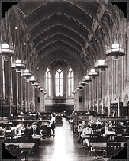 | Nayna
Jhaveri is Professor of Geography at the University of Wasington. Her interests
include; nature-society relations; post modern ecology; geography of consumption
common property; critical enviromental law; water resources; asia. |
 | Victoria
Lawson is Professor of Geography at the University of Washington. Her theoretical
and empirical work is concerned with the social and economic effects of global
economic restructuring in the Americas. |
 | Matt
Sparke is Professor of Geography at the University of Washington. His interests
are; critical geopolitics; political and economic geography; social theory including
post-colonial theory and feminist and anti-racist theory, U.S. and Canada |
 | Anthony
Giffard studies international media systems, media and international relations,
African and European media, editing and reporting, content analysis.
|
 | Patricia
Moy is Assistant Professor of Communication and studies political communication,
public opinion, media effects, and research methodology. |
 | Kevin
Kawamoto is professor of Communication at the University of Washington. His
specific areas of interest revolve around social informatics, computer-mediated
communication, computer-assisted research, online news and information technologies,
distance education, and cybercrime. |
 | Richard
Kielbwicz is Associate Professor of Communication and studies communication
history, law and policy, mass media in Canada, and history of communication technologies. |
 | Don
Pember is Professor of Communication and studies mass media law, First Amendment
history, and contemporary media. |
 | Nancy
Rivenburgh is Associate Professor of Communication and studies international
communications, media and foreign policy, intercultural communications, development
communications and cross-cultural research methods.
|
 | David
Silver is an assistant professor in the School of Communications at the University
of Washington. His research interests focus primarily around the intersections
between computers, the Internet, and contemporary American cultures. Since 1996,
he has been building the Resource
Center for Cyberculture Studies, an online, not-for-profit organization whose
purpose is to research, study, teach, support, and create diverse and dynamic
elements of cyberculture. |
 | Douglas
Underwood is Associate Professor of Communication. He studies newspaper economics,
government and the media, media coverage of business, and intellectual history
of mass media. |
 | Bryan
Jones is the Donald R. Matthews Distinguished Professor of American Politics
and Director of the Center for American Politics and Public Policy at the University
of Washington. He studies political decision-making and American public policy
processes at both the national and local levels. |
 | Michael
W. McCann is Professor of Political Science and is the Gordon Hirabayashi
Professor for the Advancement of Citizenship. His research interests include public
law, American politics, and political theory, with an emphasis on the politics
of social struggle and reform movements. more |
 | Adam
Simon is assistant professor of Political Science and pursues research relevant
to political communication. Adam and Mike Xenos coordinated the data collection
and analysis for the Student Voices project at the CCCE. |
 | Paul
Burstein is Professor of Sociology whose interests include political sociology,
social movements, social stratification, law and policy. |
 | Andrea
Simpson is Professor of Political Science at the University of Washington.
She conducts research on the politics of ethnicity in the United States. |
 | Steve
Pfaff is Professor of Sociology. He specializes in historical and comparative
sociology, social movements, politics, and issues concerning central and Eastern
Europe. |
 | Phil
Berreano is Professor of Technical Communication. His many interests include:
technology assessment; technology and social values; women, ethnic minorities,
and technology; public policies regarding data technologies, genetic engineering,
alternative technologies; and the environmental and ethical aspects of technologies.
|
 | Mark
Smith is Professor of Political Science. He is a specialist in American politics
with research interests in public opinion, interest groups, and public policy.
His current project focuses upon the use of economic reasoning by politicians
to justify and advocate policy proposals. Smith teaches courses on American politics,
interest groups, public opinion, and research design. |
 | Gerald
Baldasty is the Chair of the Department of Communication at the University
of Washington and is interested in economic aspects of media; media organizations;
media and politics; race, class, and gender. |
 | John
Gastil is Professor of Communication. His research aims to improve our understanding
of participatory democracy and to develop deliberative forms of democratic decision
making. Toward these goals, He has studied and written on the subjects of deliberative
democracy, persuasion and public opinion, democratic citizenship, and language
and democracy. more
|
 | Keith
Stamm, is Professor in the Department of Communication. He studies media and
community integration, cognitive processes of communicators, and political communications. |
 | Kathleen
Fearn-Banks is Assistant Professor of Communication at the University of Washington.
She studies Public Relations and Crisis Communications. |
 | David
Domke, Assistant Professor, studies media framing and priming; personal values,
cognition, and public opinion; race relations and social change; social science
methods; journalism. |
 | The
CCCE is fortunate to have a number of affiliates and fellows that contribute to
the intellectual mission of the Center. The faculty affiliates span five departments
at the University of Washington. The CCCE seeks to establish affiliations with
institutions throughout the US and around the world. |
 | Lance
Bennett is Professor of Political Science and the Ruddick C. Lawrence Professor
of Communication at the University of Washington. His areas of interest include
Political Communication (media and politics), Political Psychology, and American
Politics (public opinion and political behavior).
| |




























